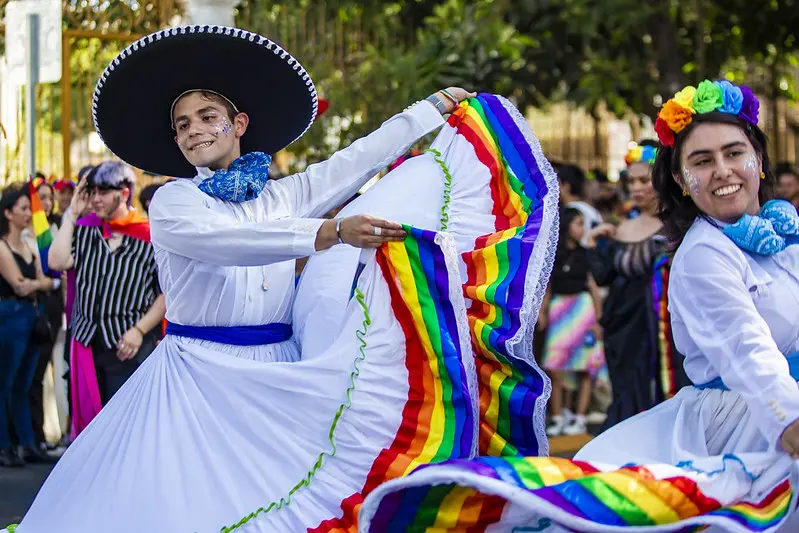
The 2024 Mexican elections were historic not only for being the largest in history, but for having the highest number of LGBTQI+ candidates running for public office. Notably, there was recognition of non-binary candidates, as well as the acknowledgment of gender identity by the electoral authority on the voter ID card and the implementation of affirmative actions to ensure representation.

Courtesy of Jalisco
In the research report “Vote for Equality: Pre-Electoral Report on LGBTIQ+ Candidacies in Mexico 2024”, conducted by Yaaj Transformando Tu Vida AC (Yaaj Mexico) and LGBTQ+ Victory Institute (members of the Observatory) it was documented that there were at least 1,212 LGBTQI+ candidates running in the federal and local elections, representing 2.79% of all candidates. Of these, 52 were non-binary individuals, representing 0.12% of the total candidates.
This was the first election in which non-binary gender identity was recognized by the electoral authority on the voter ID card, which is the main identification document in Mexico. 105 non-binary individuals obtained their ID, and 103 of them voted. Notably, the non-binary population had a participation rate of 98.1%, the highest among the population sectors.
The state with the most non-binary candidates (15) was Aguascalientes, where in recent years, the magistrate of the Electoral Tribunal, Ociel Baena, led a strategic litigation path for the recognition of non-binary identities by institutions and the guarantee of political and electoral rights for the LGBTQI+ population. Baena was murdered on November 13, 2023.

Photo from David F. Uriegas
In addition to this case, 10 other violent incidents against LGBTIQ+ candidates were documented in these elections, including the murders of 2 trans individuals, Movimiento Ciudadano commissioner Miriam Rios in Michoacán, and Morena party Senate candidate Samantha Fonseca.
In this electoral process, all political parties were required to include diverse sexual and gender identities. This measure was attempted to be rolled back in Congress just days before the electoral process began but was upheld with the support of the Supreme Court. Although this measure is positively reflected in the number of registered candidacies, it did not signify significant progress in substantive representation. On the contrary, there were notable setbacks.
The 2021-2024 legislature was the first to have trans deputies, with 2 full and 1 alternate. However, the 2024 elected legislature will not have a single trans person among its 500 deputies.
For the first time, an affirmative action was established for the integration of the Senate of the Republic, through which Celeste Asencio, a young, indigenous, out lesbian senator, was elected. It is also observed that affirmative actions in local electoral processes influenced a significant number of local congress deputy positions and city council seats being occupied by out LGBTIQ+ individuals.
There have been a significant number of reports of usurpation by individuals registered by their parties as LGBTIQ+ to meet the affirmative action requirement established by the electoral authority. Notably, there have been cases involving mayors in Michoacán and San Luis Potosí who are socially recognized as cisgender men but registered as trans women to meet this requirement.
This has sparked outrage among LGBTIQ+ collectives and activists demanding the electoral authority to implement safeguards to prevent such usurpations. This demand is undoubtedly valid but shifts responsibility away from the political parties.

Photo Courtesy of Jalisco
To confirm an individual’s affiliation with the target population group of the affirmative action, in this case, sexual and gender diversity, the electoral authority can only rely on personal statements, as establishing any other certification or validation procedure could be invasive and discriminatory.
The spirit of affirmative action is to reverse the patterns of exclusion and inequality faced by those who daily challenge hetero-cis norms, thereby making participation more plural. The responsibility for upholding and promoting that spirit should lie with political parties. However, they were the ones who missed the opportunity to ensure substantial inclusion of LGBTIQ+ leadership in politics during this electoral process.
This should prompt a deep internal reflection within the parties, guiding them to expand and strengthen their mechanisms to ensure equity and diversity as recognized and defended by the constitution in their internal processes. For actions or omissions, this electoral process highlights that one of the biggest barriers to fair political representation was the parties themselves.
In the coming months, the organizations comprising the observatory will release a second report with post-electoral characteristics, providing detailed and updated information on which LGBTQI+ candidates won and the challenges they faced, as well as the first report on LGBTIQ+ political participation in Latin America and the Caribbean.
Observing the electoral process from a sexual diversity perspective allows us to be more precise in our demands and requirements to deepen democracy and ensure equality. Follow the work of this observatory closely at www.liderazgoslgbt.com.
